.jpg) |
| Camille Erlanger's L'Aube rouge in rehearsal at Wexford Festival Opera |
This year's Wexford Festival Opera opens on 24 October with the theme, Women & War with operas including Donizetti's Zoraida di Granata, La ciociara by contemporary Italian composer Marco Tutino and L'Aube rouge by the French composer Camille Erlanger. La ciociara is conducted by Francesco Cilluffo, Wexford's principal guest conductor and I chatted to him about the opera earlier this year, see my interview. L'Aube rouge will be directed by Ella Marchment and conducted by Guillaume Tourniaire, and I caught up with Ella, in the midst of rehearsals, to talk about Erlanger and his opera.
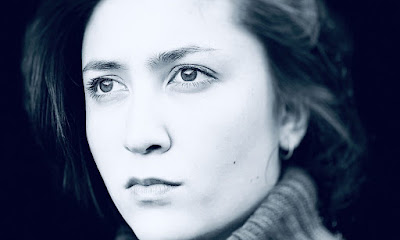 |
| Ella Marchment |
Camille Erlanger (1863-1919) studied the Paris Conservatory under Léo Delibes, won the Prix de Rome in 1888 and wrote nine operas including the five-act music drama Le Fils de l’étoile, written for the Paris Opéra, where it enjoyed success. Erlanger was Jewish and served as choirmaster of the Synagogue des Tournelles in the Marais district of Paris. He is perhaps best remembered now (if at all) for his opera Le Juif polonais, a more enduring success in its day. L'Aube rouge premiered in Rouen in 1911, it inhabits a similar world to Giordano’s Fedora, with Nihilistic plots forming the backdrop. But since Erlanger's death, his operas have almost dropped off the radar.
[Note: Camille Erlanger should not be confused with his contemporary, the Anglo-French composer Baron Frédéric Alfred d'Erlanger (1868 – 1943) whose works include an opera, Tess (to a libretto by Luigi Illica after Thomas Hardy’s Tess of the d’Urbervilles) which premiered at the San Carlo in Naples, and a ballet, Les cents baisers which was performed by the Ballets Russes and choreographed by Bronislava Nijinska]
Ella had not come across the Erlanger's L'Aube rouge before Rosetta Cucchi, Wexford's artistic director, asked her to direct the piece. Now, Ella finds it astonishing that no-one has ever heard of or even heard the work. Yet, during his lifetime he was a great success and called the French Puccini. Ella calls L'Aube rouge a real Verismo opera, there are no ensembles or duets and has the text word for word. And the music is incredible, she describes it as beautiful and sumptuous with every note having a real dramatic intention.
It was conductor Guillaume Tourniaire who originally discovered the work (and he is conducting another Erlanger work, La Sorcière, in Geneva in December). There are no recordings of the opera, nothing to give the singers an idea of the tempi, making learning the work so much more difficult. So, even though it is a Verismo/Romantic opera, it is like doing a new piece. To take the work on board, Ella played it at the piano whilst a repetiteur friend recorded themselves playing and singing, giving a vague idea of the work. The sole orchestral score is with the conductor, so when they started rehearsing they had little idea of the orchestration. They have also discovered that the orchestral score does not match the vocal score, so in one duet the vocal score has the two vocal lines swapped, meaning the singers had to re-learn the duet. To bring all the material together, you need a fanatic, which Ella describes conductor Guillaume Tourniaire as being. He has spent much time going through the parts and his real love of the music infects everyone in the room.
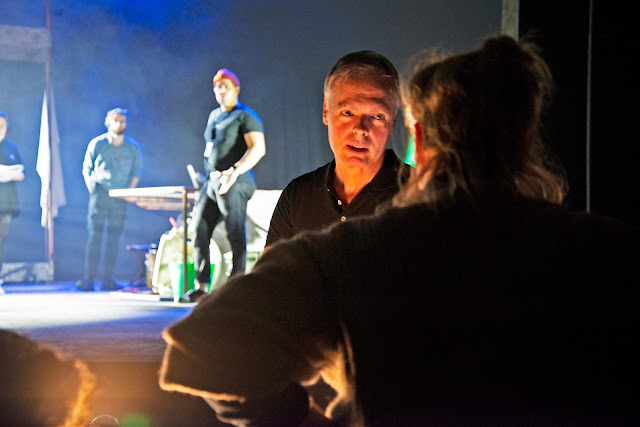 |
| Camille Erlanger's L'Aube rouge in rehearsal at Wexford Festival Opera |
The whole thing has been a journey of discovery, with logistics to be considered, for instance, there is a lot of off-stage singing and quite a few sound effects. Ella calls it bizarre in a wonderful sense, with a mixture of Verismo and standard operatic tropes. Act One features the Nihilists sitting around a dead fire, much like La Boheme, whilst the second act evokes Tosca and the end even has a mad scene for the heroine.
With an opera no-one has ever seen and an unfamiliar plot, Ella had to consider how to present the piece and at first it was something of a learning curve. For instance, there is a scene in a hospital, a dodgy place where they don't ask the Nihilists for paperwork. They had to adjust their initial ideas for the staging because Ella realised that the audience needed to know where it was set.
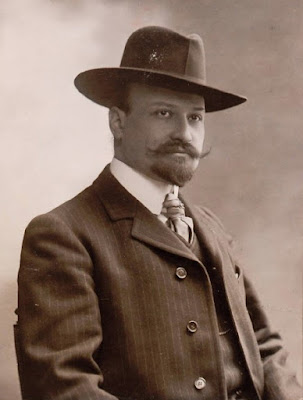 |
| Camille Erlanger |
The setting is a challenge, moving from St Petersburg to a wedding in the South of France, to Paris to a hospital to the outskirts of Moscow. All over the place dramatically, yet you need to present each setting. Ella and designer Holly Piggott chose a materialistic yet minimalist approach to the setting. A lot of Ella's directing recently has taken an historical approach to the setting, true to the book. L'Aube rouge is essentially about terrorism, with the heroine being torn between love (for one of the Nihilists) and duty to justice, in a way it is quite a heavy opera. At first, Ella was a bit torn, but all the strands in the opera linked to events today. The war in the Ukraine came as they were planning, making them consider how to represent Russia today. The hypocrisy and tyranny of the historical regime are the same today. They moved the setting to a contemporary world, resulting in something of a grim research period.
Ella mentions a bombing of the FSB (Federal Security Service of the Russian Federation) headquarters by an 18-year-old who stated that he had waited until he was 19 so his parents were not held responsible, but that for anyone over 18, he doesn't know what they are waiting for. And this is the energy of the opera's leading character, Serge, though he flip-flops between terrorism and love, until at the end there is no way out for him except a suicide bomb mission. A really tragic piece, the work has an operatic sense of heightened emotion and realism, yet a lot of elements of the opera are represented in society today.
She has tried to set the opera in the right place, giving it emotional resonances to events today, yet creating a unified contemporary setting. This use of a modern setting is something that Ella had not done much recently [she directed the UK premiere of Mark Adamo's Little Women for Opera Holland Park in 2022, see my review].
With three main-stage productions opening sequentially at Wexford on 24, 25 and 26 October, Ella describes the rehearsal schedule as dizzy and hectic but in a lovely way, as each production time moves between stage and studio in a way far different from conventional opera houses. Essentially, the festival is a repertory company and the different productions share resources such as the dancers, and whilst the leads in L'Aube rouge are only in that opera, the rest of the singers are in other operas too, including two of the bigger roles. And, inevitably, whichever production is rehearsing on stage takes precedence.
To add to their headaches, the third biggest role Kouragine was being played by Giorgi Manoshvili, who sang Calibano in Halevy's La Tempesta in 2022 [see my review], and Manoshvili was stuck in his native Georgia having visa problems complicated by the fact that Ireland does not have an embassy in Georgia. As I chatted to Ella on Tuesday, Manoshvili had arrived at the weekend and Ella had managed to rehearse him in nearly all his scenes. His presence in the opera was important as the opera has tenors and one lyric baritone, but only Kouragine is a bass. During these headaches, Ella comments that Rosetta Cucchi was wonderfully calm, telling Ella to have faith; the sign of a fantastic leader. Ella adds that Rosetta is very direct, if she was worrying she would tell you.
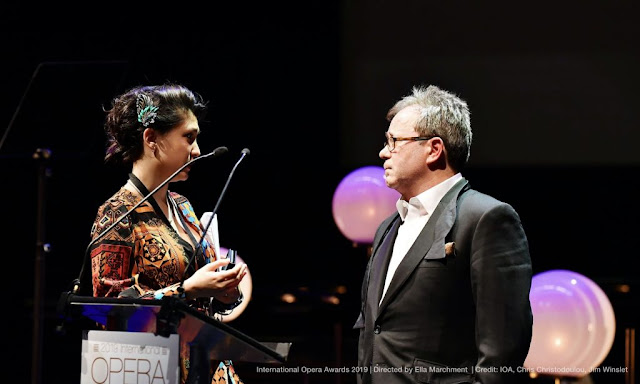 |
| Ella Marchment at the 2019 International Opera Awards, which she directed, with James Clutton of Opera Holland Park |
The result is a pace that is fast and furious, but this is Ella's third year in Wexford, so she is prepared. In 2017, she assisted Fiona Shaw who was directing Cherubini's Medea, and Shaw has become valuable a mentor to Ella. Then in 2019, she returned to direct one of the smaller productions, Rossini's L'inganno felice. As these smaller productions rehearsed in the mornings, she also assisted Rodula Gaitanou in Massenet's Don Quichotte. This year she has what she describes as the most lovely group that she has worked with, with a brilliant energy together. She adds that you have to be able to have fun in the rehearsal room when you are exploring a piece so dark and serious.
This year will be Ella's first production as director on the main stage, and her first experience of Rosetta Cucchi as artistic director. She is amazed and touched that Rosetta asked her, and was willing to take the big leap from Ella assisting to directing.
Ella is Director of Opera at Shenandoah Conservatory in the USA [see my 2022 interview with her]. They support her continuing to direct and were really kind, giving her time off. This term, the students are doing what she calls a crazy difficult production. She has written a script which brings together works by Missy Mazzoli, Meredith Monk, Julius Eastman and others, difficult vocal music that is not normally staged. The piece takes historical characters and places them in a space where they are waiting to be judged whether they go to heaven or hell, with a live audience vote (during the Julius Eastman work) at the end. It will feature singers, dancers and live VR. A complex show which premieres on 9 November 2023!
In April, next year she is doing Shostakovich's Moscow, Cheryomushki at Shenandoah. She has other interesting plans for 2024, but none of these are finalised yet.
Ella Marchment's production of Camille Erlanger's L'Aube rouge opens at Wexford Festival Opera on 25 October 2023, conducted by Guillaume Tourniare with Andreea Soare as Olga, Andrew Morstein as Serge, Ava Dodd as Sonia and Giorgi Mansohvili as Kouragine - details from the Wexford website.
Never miss out on future posts by following us
The blog is free, but I'd be delighted if you were to show your appreciation by buying me a coffee.
Elsewhere on this blog
- The flower fairies are back: Cal McCrystal's production of Gilbert & Sullivan's Iolanthe for ENO fills the London Coliseum with colour, movement & comedy - opera review
- Up Close & Stormy: Lucy Schaufer launches Up Close & Musical 2023 at the Fidelio Cafe - concert review
- Offenbach's La princesse de Trébizonde from Opera Rara performed with wit & style, you can't help but be drawn in & have as much fun as the performers - record review
- A 3D, surround sound, high definition Vespers for the 21st Century: Monteverdi's Vespers of 1610 from I Fagiolini at Kings Place - concert review
- Modernising Monteverdi: The Coronation of Poppea from English Touring Opera in a radical new version by Yshani Perinpanayagam - opera review
- The 1930s sextet: contrasting works from Dohnanyi and Poulenc at the heart of Kaleidoscope Chamber Collective and Orsino Winds collaborative concert - concert review
- The sheer delight of playing together: Ben Goldscheider & friends in Brahms, Schumann & Joseph Phibbs premiere at Hatfield House - concert review
- What is essential is that you have to be passionate about the work: Canadian baritone Étienne Dupuis, Don Carlo in the Royal Opera's revival of La Forza del Destino on his clutch of Verdi roles - interview
- Three more gems: British Piano Concertos from Simon Callaghan & BBC National Orchestra of Wales - record review
- Dramatick Opera: Christian Curnyn and the Early Opera Company in Purcell and Dryden's King Arthur at Temple - opera review
- Drinking the stars: Mary Dullea plays the piano music of John McLachlan - record review
- Home

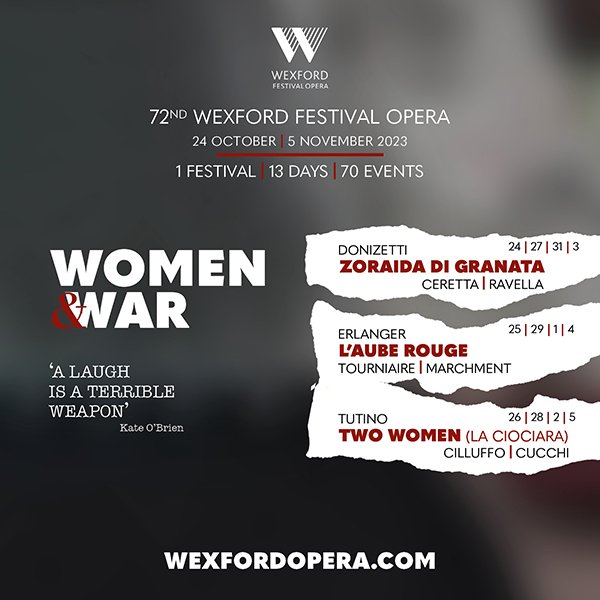


.jpg)







No comments:
Post a Comment